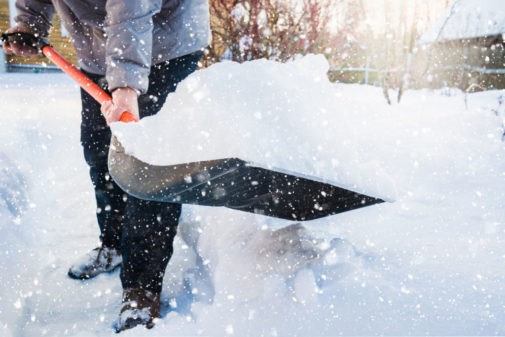What You Need to Know about Shoveling Snow
 Have you ever heard of “heart attack snow?”
Have you ever heard of “heart attack snow?”
It’s not a myth. So, before you pick up a shovel to clean the snow around your property, there are some things you should keep in mind.
If you are healthy and athletic, snow shoveling can be a good exercise. However, if you are at high risk for heart disease or have a pre-existing heart condition, snow shoveling can be dangerous unless you take some precautions.
“The heart is pumping blood through a complex branch of arteries. Smaller arteries in your legs and arms constrict in the cool weather, and this puts a strain on the heart,” says Dr. Shoeb Sitafalwalla, a cardiologist and chief medical officer at Advocate Good Shepherd Hospital in Barrington, Ill. “In addition to this, lifting a heavy amount of snow increases the heart rate and oxygen demand. This combination can be lethal in a person with pre-existing heart disease.”
Dr. Sitafalwalla recommends the following six tips for safe snow shoveling:
- Check with your doctor first. If you have a risk factor, consult with your physician as a safety check to make sure it’s safe for you to clear the driveway or sidewalk.
- Push the snow, don’t lift it. Pushing the snow is less strenuous on your heart.
- Use a snow blower. Even pushing a heavy snow blower can be dangerous, so be careful and take frequent breaks.
- Avoid a heavy meal before shoveling snow. Heavy meals have a tendency to attract more blood towards the gut and away from the heart, which is being heavily taxed during snow shoveling.
- Avoid drinking alcohol. Alcohol can constrict blood vessels, which creates back pressure on the heart. Drinking before snow shoveling is not safe.
- Make sure to stretch. You need to stretch before and after shoveling snow so you don’t strain or injure your back, especially when the snow is heavy and wet.
“If you don’t know you may be at risk for heart disease, you should pay attention to some red flags, such as chest pain, discomfort or nausea when you exert yourself, shortness of breath or severe fatigue. If you experience any of these symptoms, you should check with your physician before shoveling snow,” says Dr. Sitafalwalla.
Article contributed by: Sonja Vojcic
Tags: #heartattack, #parishnurse, #shovelingsnow

Comments are closed here.